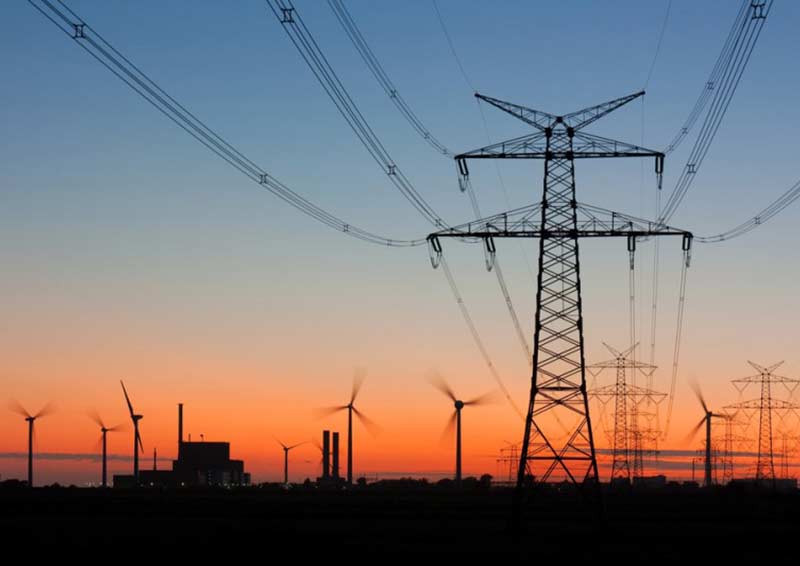Electrical energy
Electrical energy is the term given to energy that has been converted from electric potential energy. This electric potential energy has usually been in turn converted from another source of energy, through a process known as generation.
Electrical energy is supplied by a voltage (or electrical potential) delivered via an electric current.
Electrical power is defined as the rate at which electrical energy is transferred via an electrical circuit over a given amount of time. It is therefore the rate of ‘doing work’. The SI unit of electrical power is the watt, which equates to an energy transfer rate of 1 joule per second.
In the context of buildings, electrical energy is typically converted into other forms of energy, to serve useful purposes such as heating, lighting, motion or other forms of electrical power conversion.
Electrical energy for use in buildings is often supplied via a grid connection, and typically originates at a power station, where it has been generated by electro-mechanical generators. Electrical energy can by generated by many means, such as chemical combustion, nuclear fission, or renewable means such as flowing water, wind, geothermal heat and solar voltaic.
Equally, electrical energy may be generated at the building itself, typically either via solar voltaic, localised electromechanical generators or other renewable sources. Such energy may be used locally within the building or may be exported back into the grid for use by other consumers. Where this latter facility exists, the building and its system are referred to as a ‘prosumer’ – i.e. a simultaneous producer and consumer of electrical energy.
--ECA
[edit] Related articles on Designing Buildings
- Ampere.
- Articles about electricity.
- BEAMA.
- Consumer electronics.
- Consumer units.
- ECA articles.
- ECA.
- Electric lock.
- Electric motor.
- Electrical appliance.
- Electrical consumption.
- Electrical equipment.
- Electrical installation.
- Electrical power.
- Electrical safety.
- Electrician.
- Electricity bill.
- Electricity supply.
- Glossary of electrical terms.
- IET announces release of 18th Edition Amendment 2.
- Voltage.
- Watt.
Featured articles and news
Infrastructure that connect the physical and digital domains.
Harnessing robotics and AI in challenging environments
The key to nuclear decommissioning and fusion engineering.
BSRIA announces Lisa Ashworth as new CEO
Tasked with furthering BSRIA’s impressive growth ambitions.
Public buildings get half a million energy efficiency boost
£557 million to switch to cleaner heating and save on energy.
CIOB launches pre-election manifesto
Outlining potential future policies for the next government.
Grenfell Tower Inquiry announcement
Phase 2 hearings come to a close and the final report due in September.
Progress from Parts L, F and O: A whitepaper, one year on.
A replicated study to understand the opinion of practitioners.
ECA announces new president 2024
Electrical engineer and business leader Stuart Smith.
A distinct type of countryside that should be celebrated.
Should Part O be extended to existing buildings?
EAC brands heatwave adaptation a missed opportunity.
Definition of Statutory in workplace and facilities management
Established by IWFM, BESA, CIBSE and BSRIA.
Tackling the transition from traditional heating systems
59% lack the necessary information and confidence to switch.
The general election and the construction industry
As PM, Rishi Sunak announces July 4 date for an election.
Eco apprenticeships continue help grow green workforce
A year after being recognised at the King's coronation.
Permitted development rights for agricultural buildings
The changes coming into effect as of May 21, 2024.























